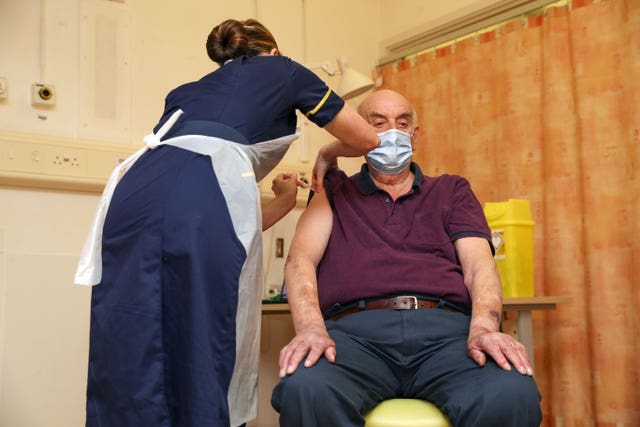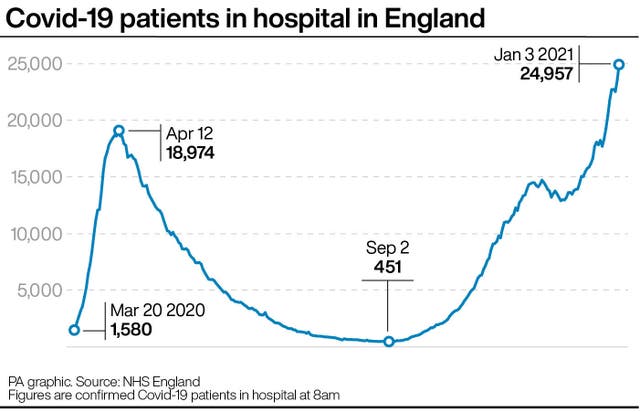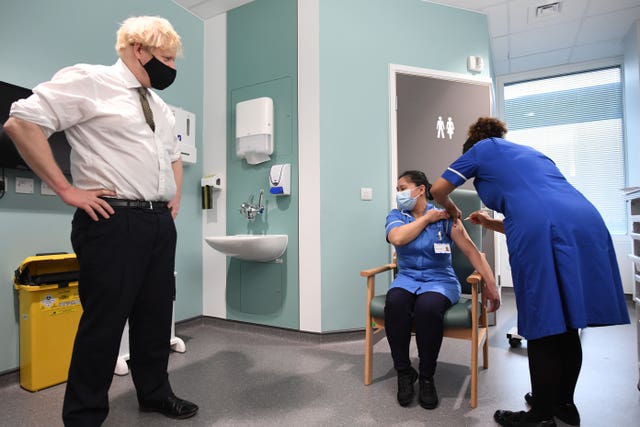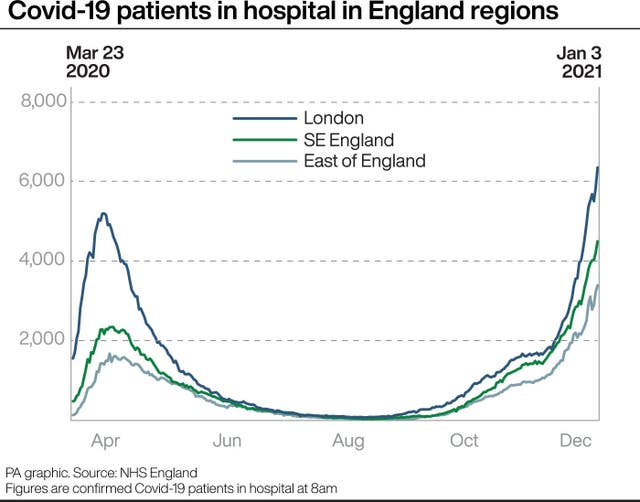Boris Johnson: ‘No question’ tougher action needed to curb coronavirus spread
The Oxford/AstraZeneca vaccine is now being deployed but Boris Johnson warned of tough weeks ahead as cases surge.

Boris Johnson warned of “tough, tough” weeks to come as the Government came under pressure to announce another national lockdown amid concerns the new variant coronavirus is spreading out of control.
The Prime Minister said there was “no question” about the need for tougher measures which would be announced “in due course”.
His comments came as the national rollout of the Oxford/AstraZeneca vaccine began, with 82-year-old former maintenance manager Brian Pinker the first person to receive the jab outside of clinical trials.
Mr Johnson acknowledged the concern about the rising number of coronavirus cases.
The latest data show a 33% rise in the number of confirmed coronavirus patients in hospital in England between Christmas Day and January 2, figures which have caused alarm in Whitehall and the health service.
“If you look at the numbers there’s no question we will have to take tougher measures and we will be announcing those in due course,” Mr Johnson said during a visit to Chase Farm Hospital in north London.
The Government hopes to get the virus under control while vaccinating as many people as possible in the hope that things will appear brighter in spring.

Ministers have said the NHS has the capacity to deliver two million doses a week of the Oxford vaccine once it receives supplies from the manufacturers.
Mr Johnson said: “We have the capacity, the issue is to do with supply of the vaccine.
“It’s not so much a manufacturing issue although that’s part of it.
“Each batch needs to be properly approved and quality controlled.”
Meanwhile uncertainty continued around the reopening of England’s schools.
Health Secretary Matt Hancock insisted it is safe for primary schools to reopen in all but the worst-hit areas of England following the Christmas break.

He said teachers are at no greater risk of contracting the disease than the rest of the population.
“There is clear public health advice behind the position that we have taken and that is what people should follow because, of course, education is very important as well, especially for people’s long-term health,” he told Sky News.
The Government is coming under pressure from unions in the education sector to order a “pause” in a return to the classroom until the safety of staff and pupils can be guaranteed.
In a joint statement, the GMB, NAHT, NASUWT, NEU, Unison and Unite unions said there is a “serious risk” of staff falling ill while the rate of infection is so high.
“The Government’s chaotic handling of the opening of schools has caused confusion for teachers, school staff and parents alike,” they said.
“Bringing all pupils back into classrooms while the rate of infection is so high is exposing education sector workers to serious risk of ill-health and could fuel the pandemic.”

Shadow education secretary Kate Green said there needs to be a “stronger set” of coronavirus restrictions in place with a clear “stay at home” message to the public.
She told BBC Radio 4’s Today programme: “It is very clear that the Government has lost control of the virus, we’re seeing a really alarming rise in cases and in the spread of the infection.”
Dr Mike Tildesley, a member of the SPI-M modelling group which advises the Government, warned that closing schools would not be enough to get the R number – the reproduction rate of the virus – below one without better public adherence to the wider restrictions.
Dr Tildesley said: “It’s not clear, actually, with the work that we’ve been looking at, that closing the schools, for example, may be sufficient to bring the R number below one with the levels of adherence we’ve got now.
“So they do need to think of alternative measures to get people back on side and get those levels of compliance we had before.”
Mr Johnson urged the public to comply with the rules in their area despite the frustration the restrictions caused.
“We will do everything we can to keep the virus under control and people should be in no doubt that the Government will do everything that’s necessary,” the Prime Minister said.
“But I must stress at this critical moment it is so vital that people keep disciplined.”
The Scottish Parliament was being recalled on Monday to consider further restrictions following a rapid increase in cases there.
Meanwhile, Professor Stephen Powis, national medical director of NHS England, described the rollout of the Oxford/AstraZeneca vaccine as “another turning point in our way out of this pandemic”.

Dialysis patient Mr Pinker received his jab at 7.30am on Monday from nurse Sam Foster at Oxford University Hospitals NHS Foundation Trust’s Churchill Hospital.
Prof Powis said the vaccine will be delivered in around 100 hospital hubs and 700 centres in GP practices and in the community by the end of the week, with plans to expand as more supplies become available.





